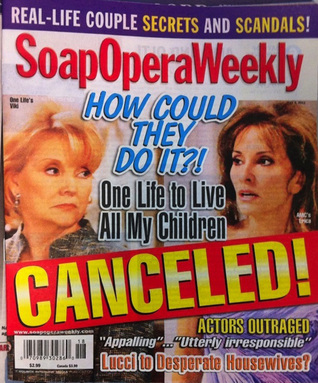Here’s the cover of Soap Opera Weekly (captured with my iPhone), screaming in rage about the news that two iconic soaps were cancelled. Didn’t matter that people weren’t watching, that ratings for soaps have been sinking for a while. No, the cancellations were an outrage. Appalling. Irresponsible. We want our soaps!
And, often enough, we bypass our own not so pleasant truths — that (for instance) people aren’t listening to classical broadcasts, that ticket sales are falling, that the money to support the Philadelphia Orchestra in its accustomed style just isn’t there. We don’t want to deal with any of that. We deny that it’s happening. We demand our classical music.
If you think I’m exaggerating, follow the link. (It goes to a story I wrote for the Wall Street Journal about cutbacks in classical broadcasting in New York.)
But there’s a flip side to our passion for our art. We might (self-righteously, I fear) insist that claim that not only are we deprived of classical music, but that civilization itself is threatened. Which is hardly true, and certainly won’t convince anyone not already on our side.
The link is amusing — if classical music declines any further, says Pinchas Zukerman, we’ll see riots in the streets!
Whereas what we should do is take our bad news like grownups, and go out and develop an audience for classical music so strong and large that no one can ignore it. Easier to say than do, I’ll grant, though I think that — taking all of us together — we’ve taken the first steps.
And I’m sure we can succeed! But not by bombarding the media, or government, demanding support. If we’re that helpless — that weak, so strongly relying on the kindness of strangers (which they’re not going to give us) — then do we deserve to survive?


Is not enough fans really the problem? Ticket prices are ridiculous, yet they still have “half full halls”! If I could fill half of Benaroya with even the cheapest tickets — $17 — I’d be made in the shade. With $80+ tickets, add merch sales on top of that, and you’d have to be trying pretty hard to lose money.
As Heath Ledger so memorably said, “why so serious?” If these lifestyle programs — the ones that are making money — are “less serious than Beethoven,” then maybe that’s the problem — it’s too serious.
Perhaps greater news coverage would be generated if classical music fans were to demonstrate on the streets clad in black tie. But that might play badly toward a stereotype.
Many here may know that there’s a wonderful video on Ted.com in which Benjamin Zander suggests a compelling, positive approach to widening classical music’s audience among young people and others.
Finally, could possible loss of magazine sales and advertising be subtle elements magnifying soap opera magazine outrage over TV show cancellations?
Sometimes these kinds of protests work. I’m recalling another example during a time that Marvel comics was in the process of redefining itself it took all of its main titles, very popular franchises today) and restarted the numbering scheme at issue #1 which, for many fans, completely obliterated the continuity and history of the comics (most of which had been running continuously since the 60s). So instead of reading issue #612 of The Incredible Hulk you were left with issue #4.
It was one of the many attempts by Marvel comics to get out of the post 90s slump and generate a newer audience by making the history of the books seem newer and more appealing to an audience that hadn’t been reading the comics for decades (sometimes the storylines also reflected this).
It failed, the older fans protested and Marvel slowly reintroduced the old numbering scheme, first in conjunction with the current one so you would see that issue of The Incredible Hulk listed as issue #612(4) then eventually losing the newer numbers altogether.
Point is, the history of the Soaps, the Comics, and the Orchestras can sometimes be part of its strength–and while there may be short term initiatives that could ameliorate flagging revenue, it’s not entirely clear that cancellation, renumbering, completely overhauling will generate enough revenue to offset the historical value of the franchise or property.
For the record, I’m sad to see these soaps go myself. I only occasionally watched them as a child with my mother, but even something like this was enough a part of my personal history that I can feel at least a small hole with the loss.